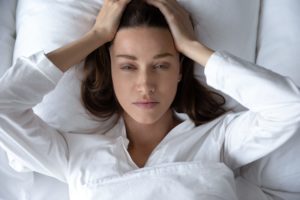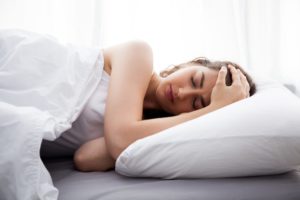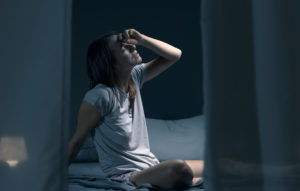Postpartum Night Sweats
Someone with night sweats experiences significant sweating while they sleep. For some people, night sweats are so severe that they soak through pajamas and bedding. While commonly associated with menopause, night sweats can also have other causes. In the period after giving birth — also known as the postpartum period — night sweats precipitated by nighttime hot flashes are fairly common.
Research suggests that in the weeks and months following birth, approximately 29% of people experience nighttime hot flashes, also sometimes described as postpartum night sweats. We discuss what causes this phenomenon, how long postpartum night sweats last, and tips for keeping cool during sleep.
What Happens During Postpartum Night Sweats?
Sweating is the body’s natural way of keeping the body from overheating, but during postpartum night sweats, the body produces far more sweat than is necessary to keep cool .
Postpartum night sweats tend to involve the same symptoms as nighttime hot flashes that occur during menopause. An intense sensation of heat usually starts in the upper body , then spreads throughout the rest of the body. Excessive sweating may occur during the three to five minutes that the hot flash lasts, and afterward, the person may shiver or feel anxious .
Night sweats may be more likely to happen in the first half of the night . They can also interfere with sleep, as they often cause the sleeper to wake up. Frequent awakenings from night sweats may also cause a person to feel unrested the next day or may worsen the sleep deprivation that new parents already experience.

What Causes Postpartum Night Sweats?
Despite many popular sources documenting lived experiences, academic research has yet to verify the causes of night sweats during pregnancy and the postpartum period. That said, there are some indications that night sweats might allow the body to eliminate excess fluids immediately following birth and might also be fueled by hormone fluctuations.
Losing Fluids from Pregnancy
In late pregnancy, fluids often accumulate in the body as a result of hormonal and physical changes. The average pregnant person retains an additional 6.5 liters of water during pregnancy. Some experts theorize that night sweats might be one way the body rids itself of excess fluids that built up during pregnancy.
Low Estrogen Levels
People who have given birth experience significant hormonal changes in the postpartum period. These include a dip in estrogen and progesterone prompted by delivering the placenta and, for those who chose to do so, breastfeeding.
As in pregnancy and in menopause, hormone fluctuations in the postpartum period are thought to alter how the body regulates heat. In particular, people with declining estrogen levels appear to be especially sensitive to changes in core body temperature. Even a subtle increase in body temperature can trigger cooling mechanisms such as sweating.
It is important to note that while everyone who gives birth experiences hormonal changes, not everyone experiences night sweats following pregnancy. More research is needed to understand what other factors may be involved in postpartum night sweats.
How Long Do Postpartum Night Sweats Last?
Many people experience night sweats within days of giving birth. The good news is that hot flashes — and the night sweats that accompany them — tend to resolve on their own, though it may take time.
Limited research suggests that the incidence of night sweats peaks at two weeks postpartum , with about 20% of people reporting hot flashes during this time. The same study showed the prevalence dropped to 14% by week 12. About a year after giving birth, 10% of people still reported postpartum hot flashes.
“Overall, postpartum night sweats can be a very normal reaction of the body to the hormonal changes of pregnancy. Being aware of them, and planning how to manage them can make a big difference in how people experience the early postpartum period.”
Dr. Maya Nambisan, OBGYN
How to Reduce the Discomfort of Night Sweats
Managing night sweats involves lowering body temperature to avoid triggering hot flashes, and adjusting clothing and bedding to be more comfortable when hot flashes do occur.
- Control room temperature: Use a fan, open the windows, or lower the thermostat to keep your bedroom temperature cool.
- Wear breathable pajamas: Loose-fitting natural fabrics such as cotton tend to trap less heat than synthetic fabrics. Experts also recommend layering sleepwear that is easy to remove so that you can adjust to be more comfortable if a hot flash occurs. If you tend to soak through your pajamas, consider keeping an extra pair nearby to change into.
- Invest in cooler bedding: A cooling mattress, pillow, and sheets can minimize heat buildup and may help you maintain a more comfortable body temperature. Look for hybrid or latex mattresses with plenty of room for airflow, or consider using a cooling mattress topper.
- Sleep with a towel: If you are concerned about soaking or staining your mattress, consider sleeping on a soft towel that can absorb sweat. A mattress protector made of a breathable material can also guard your mattress.
- Stay hydrated: Be sure to drink enough water throughout the day to prevent dehydration. A small glass of cold water before bed might also help stave off night sweats.
- Deep breathing: When night sweats wake you up, deep breathing may help calm symptoms .
When You Should Contact Your Doctor
While postpartum night sweats may be a nuisance, they generally are harmless and should eventually stop without medical treatment. However, if you wake up drenched in sweat most nights, or if you find night sweats significantly compromise your sleep on a regular basis, you should discuss your symptoms with your physician.
Additionally, if the night sweats suddenly become more severe, or if any of the following symptoms accompany your night sweats, you should talk to your doctor:
- Fever
- Enlarged lymph nodes
- Intense itching
- Pain in the joints or back
- Weight loss beyond the gradual reduction of pregnancy weight
- Diarrhea
- Wheezing
- Headache
- A tendency to bruise easily
These symptoms could indicate a more serious medical condition, such as an infection, cancer, or a disorder of the nervous system. Some of these symptoms, along with night sweats, can also be caused by an overactive thyroid gland, a condition that some people develop in the postpartum period.
Night sweats may also be linked to postpartum depression. While it is normal to experience a wide range of emotions after giving birth, talk to your doctor if you experience feelings of sadness, guilt, or anxiety that persist for more than two weeks . Know that postpartum depression is treatable, and there are many resources and treatment options that can help.

Still have questions? Ask our community!
Join our Sleep Care Community — a trusted hub of sleep health professionals, product specialists, and people just like you. Whether you need expert sleep advice for your insomnia or you’re searching for the perfect mattress, we’ve got you covered. Get personalized guidance from the experts who know sleep best.
References
10 Sources
-
Smetana, G. W. (2023, February 20). In M.D. Aronson (Ed.) Evaluation of the patient with night sweats or generalized hyperhidrosis. UpToDate., Retrieved April 16, 2023, from
https://www.uptodate.com/contents/evaluation-of-the-patient-with-night-sweats-or-generalized-hyperhidrosis -
Thurston, R. C., & Joffe, H. (2011). Vasomotor symptoms and menopause: Findings from the Study of Women’s Health across the Nation. Obstetrics and Gynecology Clinics of North America, 38(3), 489–501.
https://pubmed.ncbi.nlm.nih.gov/21961716/ -
Fazio, S. B. (2022, April 19). Approach to flushing in adults. In M. D. Aronson (Ed.). UpToDate., Retrieved April 10, 2023, from
https://www.uptodate.com/contents/approach-to-flushing-in-adults -
Santen, R. J., Loprinzi, C. L., & Casper, R. F. (2022, October 24). Menopausal hot flashes. In R. L. Barbieri & W. F. Crowley (Eds.). UpToDate., Retrieved April 10, 2023, from
https://www.uptodate.com/contents/menopausal-hot-flashes -
Bryce C. (2020). Persistent night sweats: Diagnostic evaluation. American Family Physician, 102(7), 427–433.
https://pubmed.ncbi.nlm.nih.gov/32996756/ -
Cunningham, F., Leveno, K. J., Bloom, S. L., Dashe, J. S., Hoffman, B. L., Casey, B. M., & Spong, C. Y. (Eds.). (2018). Maternal physiology. Williams Obstetrics, 25e. McGraw Hill.
https://accessmedicine.mhmedical.com/content.aspx?bookid=1918§ionid=144754618 -
Thurston, R. C., Luther, J. F., Wisniewski, S. R., Eng, H., & Wisner, K. L. (2013). Prospective evaluation of nighttime hot flashes during pregnancy and postpartum. Fertility and Sterility, 100(6), 1667–1672.
https://pubmed.ncbi.nlm.nih.gov/24035604/ -
A.D.A.M. Medical Encyclopedia. (2022, August 15). Cancer treatment: Dealing with hot flashes and night sweats. MedlinePlus., Retrieved April 10, 2023, from
https://medlineplus.gov/ency/patientinstructions/000826.htm -
Berens, P. (2023, March 21). Overview of the postpartum period: Normal physiology and routine maternal care. In C. J. Lockwood (Ed.). UpToDate., Retrieved April 16, 2023, from
https://www.uptodate.com/contents/overview-of-the-postpartum-period-normal-physiology-and-routine-maternal-care -
Office on Women’s Health. (2021, February 21). Recovering from birth. U.S. Department of Health & Human Services., Retrieved April 10, 2023, from
https://www.womenshealth.gov/pregnancy/childbirth-and-beyond/recovering-birth





